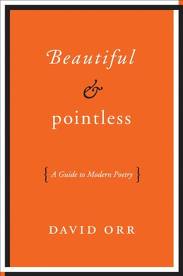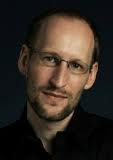
Orr asks many of the same questions about poetry that I have, and he answers them. Are all published poets raging liberals? (Yes, mostly.) What is it about poetry that seems so personal to read it, and even more personal to write it? (Or is that a figment of our imaginations?) Does modern poetry really have or use “forms, ” or has all of that been swept away, except for occasional exercises in “how to write a haiku?” What motivates people to write poetry? Is there any real value to the creative writing industry (conferences, workshops, panels, competitions) or is it only small groups of people who stand around drinking and trying to sound clever? And what’s the point of the whole thing?
(There’s also another question Orr doesn’t ask – does poetry have to rhyme, or does it have to not rhyme? I suspect his answer would be yes.)

And in a very odd yet not unexpected way, Orr answers the questions like a poem answers questions – with a fair amount of ambiguity. Like a poem, he stops short of definitive answers (as if poetry really has any definitive answers) and instead he challenges us to look for answers in the directions he’s pointed.
The three claims Orr says are usually made for poetry – that it is a special connection to language, that it has a unique connection with our selves, and that it has a special position relative to society and/or culture – he largely dismisses, and in the case of the last two, rather quickly and succinctly dismisses. And yet he acknowledges that poetry occupies some kind of place in the public’s mind as something rather sublime. Even it that’s wrong, and it shouldn’t do that, the fact is that it does.
And he’s written a highly readable book on why that is, and perhaps why that isn’t.
Related: “Thoughts on Beautiful & pointless” is posted at Faith, Fiction, Friends.
- Poets and Poems: Forrest Gander and “Mojave Ghost” - March 27, 2025
- Poets and Poems: Siân Killingsworth and “Hiraeth” - March 25, 2025
- Poets and Poems: Donna Hilbert and “Gravity” - March 20, 2025
Maureen Doallas says
Orr’s title calls up what’s so often heard about the arts: beautiful and pointless, although that bridge word usually is “but”. It’s a perspective that allows what’s happening in Britain now, the decimation of funding for the arts. We needn’t exalt, I agree; at the same time we can’t dismiss that poetry would not have survived for so many thousands of years did it not have a place in our lives.
It’s interesting to me, too, that he uses the word “Modern” rather than “Contemporary”. Consider the ruckus over the “language poets”.
I’ve been reading a lot about this book, and may have to take it up for the fun of it, see how it compares to what Dana Gioia has to say.
Maureen Doallas says
Here’s a bit about the book from Robyn Crewell at Paris Review:
http://www.fsgpoetry.com/fsg/2011/04/paris-review-robyn-creswell.html
I hope a recording of the panel discussion tonight will be made available.
nance marie says
what seems pointless to the world…
is important for our soul.
nmdr